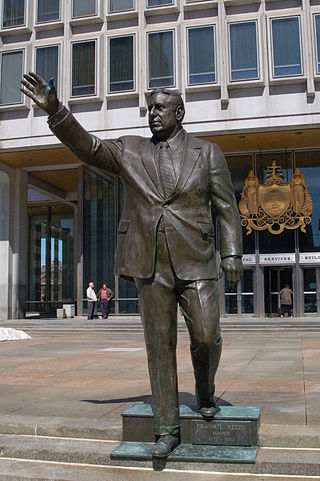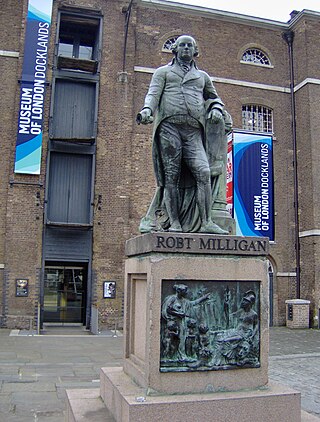
Iconoclasm is the social belief in the importance of the destruction of icons and other images or monuments, most frequently for religious or political reasons. People who engage in or support iconoclasm are called iconoclasts, a term that has come to be figuratively applied to any individual who challenges "cherished beliefs or venerated institutions on the grounds that they are erroneous or pernicious."

Monument Avenue is a tree-lined grassy mall dividing the eastbound and westbound traffic in Richmond, Virginia, originally named for its emblematic complex of structures honoring those who fought for the Confederacy during the American Civil War. Between 1900 and 1925, Monument Avenue greatly expanded with architecturally significant houses, churches, and apartment buildings. Four of the bronze statues representing J. E. B. Stuart, Stonewall Jackson, Jefferson Davis and Matthew Fontaine Maury were removed from their memorial pedestals amidst civil unrest in July 2020. The Robert E. Lee monument was handled differently as it was owned by the Commonwealth, in contrast with the other monuments which were owned by the city. Dedicated in 1890, it was removed on September 8, 2021. All these monuments, including their pedestals, have now been removed completely from the Avenue. The last remaining statue on Monument Avenue is the Arthur Ashe Monument, memorializing the African-American tennis champion, dedicated in 1996.

Alex von Tunzelmann is a British popular historian, screenwriter and author.
Fallen Idol(s) may refer to:

Red Heat: Conspiracy, Murder, and the Cold War in the Caribbean is a historical study of the political scene in the Caribbean during the 1950s and 1960s, written by the British historian Alex von Tunzelmann and first published in 2011 by Henry Holt and Company. Educated at Oxford University, Von Tunzelmann (1977-) had previously published a study of the independence of India, entitled Indian Summer: The Secret History of the End of an Empire (2007).

The Robert E. Lee Monument was an outdoor bronze equestrian statue of Confederate general Robert E. Lee and his horse Traveller located in Charlottesville, Virginia's Market Street Park in the Charlottesville and Albemarle County Courthouse Historic District. The statue was commissioned in 1917 and dedicated in 1924, and in 1997 was listed on the National Register of Historic Places. It was removed on July 10, 2021, and melted down in 2023.

The Robert E. Lee Monument in Richmond, Virginia, was the first installation on Monument Avenue in 1890, and would ultimately be the last Confederate monument removed from the site. Before its removal on September 8, 2021, the monument honored Confederate Civil War General Robert E. Lee, depicted on a horse atop a large marble base that stood over 60 feet (18 m) tall. Constructed in France and shipped to Virginia, it remained the largest installation on Monument Avenue for over a century; it was first listed on the National Register of Historic Places in 2007 and the Virginia Landmarks Register in 2006.

There are more than 160 monuments and memorials to the Confederate States of America and associated figures that have been removed from public spaces in the United States, all but five of which have been since 2015. Some have been removed by state and local governments; others have been torn down by protestors.
The Confederate Soldiers and Sailors Monument was a commemorative obelisk that was erected in Linn Park, Birmingham, Alabama in 1905. The monument was dismantled and removed in 2020.

Richmond, Virginia, experienced a series of riots in the wake of the murder of George Floyd. Richmond was the first city in the Southeastern United States to see rioting following Floyd's murder. Richmond, formerly the capital of the short-lived Confederate States of America, saw much arson and vandalism to monuments connected with that polity, particularly along Monument Avenue.

A statue of Frank Rizzo, sometimes called the Frank L. Rizzo Monument, was installed in Philadelphia, in the U.S. state of Pennsylvania. Erected in 1998, the bronze sculpture was removed in June 2020. Black Lives Matter activists and others protested the statue's presence, and the statue was taken down during the George Floyd protests.

The Stonewall Jackson Monument in Richmond, Virginia, was erected in honor of Thomas Jonathon "Stonewall" Jackson, a Confederate general. The monument was located at the centre of the crossing of Monument Avenue and North Arthur Ashe Boulevard, in Richmond, Virginia. The bronze equestrian statue was unveiled in 1919. Along this avenue were other statues including Robert E. Lee, J. E. B. Stewart, Jefferson Davis, Matthew Maury and more recently Arthur Ashe. Thomas Jackson is best known as one of Robert E. Lee's most trusted commanders throughout the early period of the American Civil War between Southern Confederate states and Northern Union states. He rose to prominence after his vital role in the Confederate victory at the First Battle of Bull Run in July 1861, continuing to command troops until his untimely death on May 10, 1863, after falling fatally ill following the amputation of his wounded arm.

The statue of the Confederate States of America cavalry general Williams Carter Wickham by Edward Virginius Valentine was installed in Richmond, Virginia's Monroe Park in 1891, near Virginia Commonwealth University's main campus. It was toppled in June 2020 during the George Floyd protests.

The statue of Edward Colston is a bronze statue of Bristol-born merchant and trans-Atlantic slave trader Edward Colston (1636–1721). It was created in 1895 by the Irish sculptor John Cassidy and was formerly situated on a plinth of Portland stone in a public space known as "The Centre" in Bristol, until it was toppled by anti-racism protestors in 2020.

A statue of Robert Milligan was installed at the West India Docks in London, in 1813. Milligan was a merchant, and was largely responsible for the construction of the West India Docks. After being put in storage in 1943, it was re-erected by the London Docklands Development Corporation in 1997.

A bronze statue of Christopher Columbus was installed on the grounds of the Minnesota State Capitol in Saint Paul, Minnesota in 1931. The 10-foot statue was created by Italian American Carlo Brioschi.

A statue of Christopher Columbus was installed in Wilmington, Delaware, United States. It was produced by the sculptor Egidio Giaroli in Rome, and was cast and molded in the Italian city of Pistoia. The statue was unveiled on October 12, 1957, and was removed in June 2020, its status and future currently is unclear, and its impromptu removal controversial and the subject of political debate.















